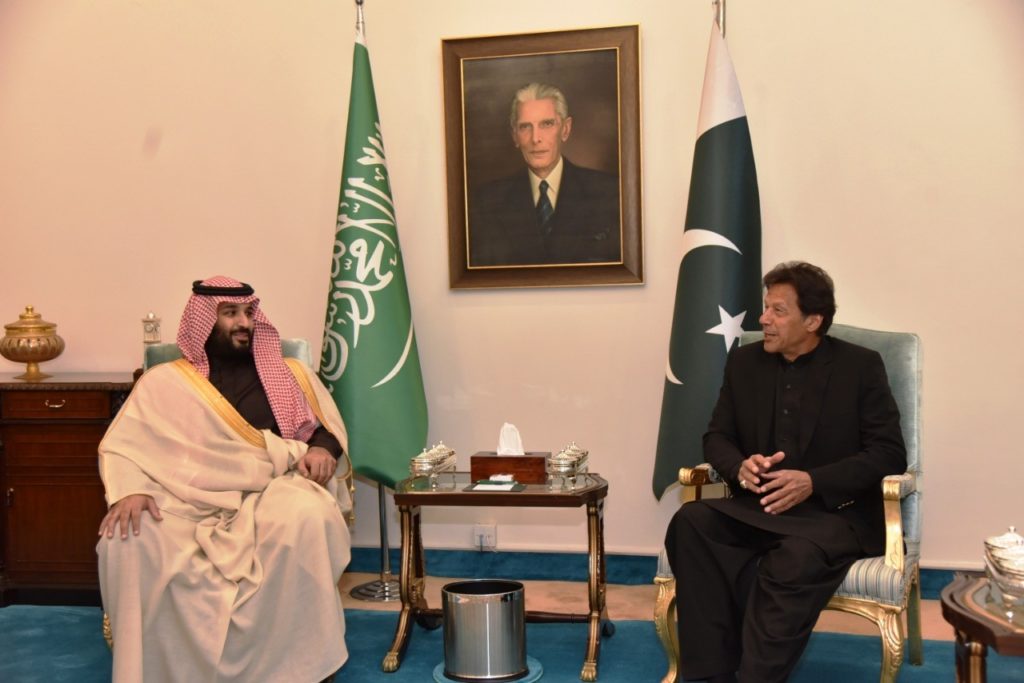Alliance of Caution: Deepening Saudi-Pakistan Ties
Ria MazumdarWhile deepening bilateral relations are overtly economic in nature, at its core they represent a key strategic move on behalf of both countries
Photo: Anadolu Agency


Last week, following Saudi Crown prince Mohammed bin Salman’s visit to Pakistan, the two countries signed a $20 billion investment deal including $8 billion dollars to fund an oil refinery in the Pakistani city of Gwadar. The deepening relationship between Saudi Arabia and Pakistan is overtly an economic alliance, but at its core represents a key strategic move on behalf of both countries. Despite some potential political benefits on either side, however, Pakistan should be cautious in this particular alliance and pay close attention to the potential security threat caused by Saudi Arabia’s involvement with Wahhabism in the region. This also has critical implications for the India-Pakistan relationship and the balance of power in the subcontinent.
For context, it is important to note that both countries could greatly benefit from a strong alliance. Pakistan is on unstable financial footing, facing depleted foreign reserves and seeking a bailout from the IMF. Saudi Arabia is facing teetering relationships with other countries after the murder of journalist Jamal Khashoggi last October, and additionally needs to diversify away from oil. Thus, both countries could use mutual assurance at this time. Official press from both countries has painted this relationship as a key military partnership throughout history, citing their roles in relation to Afghanistan during the Cold War. Pakistan currently offers substantial military support to Saudi Arabia, contributing over 60,000 soldiers and forming the backbone of the Saudi army.
Public rhetoric from both governments has also emphasized Islam as a connecting factor between the two countries. The official joint statement from the two countries wrote that Pakistan appreciated “the positive role of the Kingdom [in] resolving the issues facing Islamic Ummah worldwide” while Saudi Arabia “lauded Pakistan’s important positions in the Islamic world.” This allows Pakistan to lean in toward the Arab countries, despite having a very distinct historical and social trajectory. The implications of Pakistan joining the Arab coalition are not simply economic or political, but also very significant in terms of identity formation.
This emphasis on an Islamic identity has notable implications for Pakistan-India relations. Just last week, a Pakistan-based militant group, the Jaish-e-Mohammed, was responsible for a major suicide bombing in Kashmir that left 42 Indian paramilitary police dead. Since then, tensions have run high between India and Pakistan. Last week, India recalled its Pakistani ambassador and removed Pakistan’s most favored nation (MFN) trade status. This provides Pakistan the perfect opportunity for an economic and strategic pivot toward Saudi Arabia. Furthermore, the situation offers Indian Prime Minister Narendra Modi a perfect opportunity to harness his Hindu nationalist rhetoric against Pakistan as a Muslim nation, especially prior to India’s general elections in May. In his response, Modi stated, “If our neighbor thinks it can destabilize India, then it is making a big mistake.”
By conflating Jaish-e-Mohammed, a non-state group, with the state of Pakistan, Modi is able to shift the rhetoric from counterterrorism to intense diplomatic conflict. This should raise considerable alarm, especially since the United States supports India’s right to “self-defense against cross-border attacks” after the Kashmir attacks. After cutting economic ties, the two countries are left with only military options. As both India and Pakistan are nuclear-armed, this should generate substantial international concern.
The Saudi-Pakistan deal will thus trigger substantial shifts in the India-Pakistan relationship. It will also impact other major global players including Iran and China. China has invested $19 billion in Pakistan in the past five years and will continue to develop industrial zones as part of the China-Pakistan Economic Corridor (CPEC). While Pakistan has stated that it “welcomes Saudi Arabia to participate” in this collaborative effort, China is also liable to interpret the coziness with the Saudi Kingdom as unwanted competition. While diversifying its allies certainly bodes well for Pakistan’s investment prospects, the political consequences of the deal are likely to be volatile.
Furthermore, this alliance has significant repercussions for Iran, Saudi Arabia’s main rival in the Middle East. Pakistan has noted that “Islamabad wants good relations with Tehran but wants a peaceful end to Iranian involvement in multiple regional confrontations. However, this balancing act will be difficult to maintain as Pakistan grows closer to Saudi Arabia. There is certainly the possibility that Saudi investments and loans will bear strings and conditions with regards to Pakistan’s relationship to Iran. In particular, Saudi Arabia is likely to seek leverage against Iran, Qatar, and Turkey. Attaching conditions would be a highly strategic move on Saudi Arabia’s part, since Pakistan would likely prefer Saudi Arabian loans to the notoriously strict ones offered by the IMF. Thus, while Pakistan has stated that its relations with Iran are separate from its relationships with Saudi Arabia and the GCC, this dynamic is liable to shift as well.
It is imperative to note that Saudi aid to Pakistan in the past has been economic and investment-related, but also religiously motivated. The Saudi-funded mosques in Pakistan brought strains of the conservative Wahhabist ideology to the subcontinent, fueling anti-Shia (and therefore anti-Iran) sentiments as well as shaping the nature of Islam in Pakistan. In Gwadar, Balochistan, the site of the oil refinery in the Saudi deal, a Sunni terrorist group recently killed 27 Revolutionary Guards on the Iranian side of the border. Saudi Arabia’s ties to “extremist” Sunni groups are tremendously concerning both with regards to radicalization in Pakistan in general and the plight of its Shia minority. As the economic ties between the Saudi and Pakistani governments deepen, Pakistan will be increasingly less likely to comment on Saudi financing of such groups. This is deeply ironic, as the Commander-in-Chief of the Islamic Alliance against Terrorism, a military coalition of 41 military states, is Pakistani. Raheel Sharif is currently leader of the alliance, and has consistently articulated that Pakistan is active in the elimination of terrorism. As Pakistan experiences terrorism within its borders and increasing anti-Shia and pro-Saudi sentiment, it is not unlikely that Pakistan could become the site for a Saudi-Iran proxy conflict.
Saudi Arabia’s recent negotiations with Pakistan represent far more than a mere investment agreement or energy deal. The geopolitical consequences of this deepening relationship are multifaceted and complex. Noting Pakistan’s ideological lean-in toward the GCC and Saudi Arabia as a fellow Islamic state, this deal is likely to exasperate the critically hostile relations between Pakistan and India. Modi has the opportunity to exploit anti-Islamic sentiment, conflated as anti-Pakistan sentiment. China is likely to be irked by Saudi Arabia’s role as an economic and strategic competitor, and tensions with Iran are likely to continue or even be provoked by rising anti-Shia sentiment in Pakistan. Pakistan is less likely to grapple with the realities of Saudi Arabia’s Wahhabist project in its borders. As Pakistan looks outward beyond the subcontinent, the balance of power is likely to shift dramatically. The US and other international players must proceed with caution as this entangled alliance deepens in the future.
Ria Mazumdar is a senior at Tufts University double majoring in International Relations and Quantitative Economics. Her interests include economic development, South Asian politics, and podcasting.
Excellent observations. Beautifully and succinctly presented.